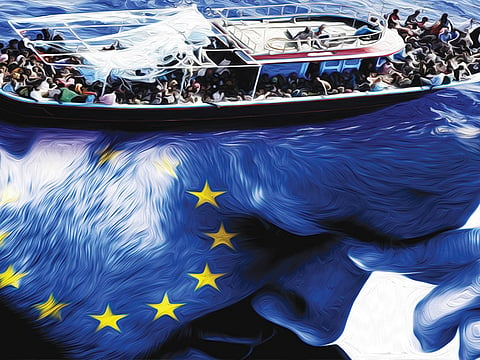Europe’s failure in facing up to crisis of conscience
Fleeing towards European shores will continue unless peace and stability return to the conflict zones in the Middle East and Africa

There was only one reason why the European Union (EU) leaders were urgently driven to hold their emergency summit in Brussels on Thursday. Try to guess?
It was not a common desire to help save migrants from facing the threat of almost certain death in the Mediterranean grave yard, nor to put down solid, effective and long-term policies to resettle them.
The only reason possibly behind the call for the emergency talks was that European leaders were facing a crisis of conscience and not knowing what to do about it.
With up to 1,000 people killed by drowning this month alone along European shores, the meeting happened as a funeral was hurriedly held in Malta for 24 unknown victims who were among the 800 refugees who drowned last week.
Many deaths among migrants have happened during the last two years, but no reaction whatsoever was forthcoming from Europe. United Nations agencies confirm that 219,000 refugees and migrants crossed the Mediterranean Sea in 2014 with at least 3,500 victims drowning.
In September alone that year, an estimated 500 migrants drowned in one incident off Malta after smugglers transferred them to a smaller vessel on the high seas. In another incident in October 2013, at least 366 people lost their lives when a vessel carrying 500 migrants began to sink and then caught fire opposite the Italian island of Lampedusa.
In addition to the 800 victims who died last Sunday, in February more than 330 people lost their lives as they were ordered by traffickers to embark from Libya on overcrowded rubber dinghies in appalling weather.
Thirty more people who were rescued earlier passed away before they could make it to hospital. Earlier this month, up to 400 migrants drowned after their vessel capsized off Libyan shores — 145 people were rescued.
It is believed that since the beginning of this year, more than 31,500 refugees managed to make the journey to Italy and Greece. The vast number of these people are fuelled by civil war in Libya and Syria. With this ever-rising tide of potential migrants, the drowning incidents have almost doubled this year and the burden has fallen almost entirely on Italy.
After the drowning of 360 people off Lampedusa in 2013, Italy set up its own search-and-rescue operation, Mare Nostrum, to save migrants from drowning, but it ceased the operation last year because it was unable to pay for the €9.5 million (Dh37.92 million) a month in view of lack of financial support from the EU. As a result, Italy arranged to hand over the naval operation to Triton, a much smaller and cheaper mission run by the EU’s Frontex border agency.
The British coalition government, supported then by the opposition Labour, refused to contribute money or naval capacity. Now, in the shadow of a looming general election, Labour has recently called on the government to “reverse” past British refusal to fund the operations.
David Cameron, Britain’s Prime Minister, responded in Brussels that he would be sending a “mini fleet” to help in the rescue operations on the understanding with prior EU approval, that his government would unconditionally reject any attempt by rescued migrants who apply for asylum in the United Kingdom.
Fear of death
UN Secretary-General Ban-Ki Moon described last Sunday’s drownings as “a tragedy of epic dimensions”.
A third of the latest victims were Syrian refugees chased away by fears of death in their own country — only to horribly drown in the Mediterranean.
In the last week alone, the UNHCR estimated that more than 1,500 migrants drowned — 28 times as many dead as in the same period last year.
European leaders spent the day in Brussels arguing not over shaping up practical and long-term solutions to the crisis of refugees, but over defining who is a migrant and who is a political refugee.
Italy, Greece and Malta estimate that there are about one million willing migrants ready to cross their shores but only 5,000 will be taken by the 28 EU countries. European leaders have all along been blindly adamant in refusing to consider the issue for the common good. They cannot close their eyes to the fact that what has been happening in West Africa, Libya and now in Syria, where the vast majority of migrants originated, is historically the West’s responsibility.
Migrants and refugees have no choice but to flee from war and poverty. Fleeing towards European shores will continue unless peace and stability return to the conflict zones in the Middle East and Africa.
The EU summit resolution to boost its funding and search-and-rescue operation to some €120 million, effectively restoring the mission of Mare Nostrum, may slightly clear the burden of guilt from the European conscience now, but it will not prevent the tragedy from happening again.
Also, comparing migrants to “cockroaches” and encouraging governments to use “gunships” to crush them, as columnist Katie Hopkins suggested in Robert Murdoch’s widely distributed British tabloid, the Sun, will not stop desperate refugees from crossing the Mediterranean for the unknown comfort they dream of.
Mustapha Karkouti is a former president of the Foreign Press Association, London.
Sign up for the Daily Briefing
Get the latest news and updates straight to your inbox


